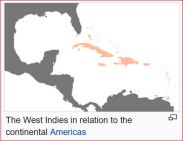.
"By the end of the 18th century, the British army was the single biggest purchaser of slaves." (at 1:50 on video, Forces News). Added: “In the 1790s the British Government was the largest purchaser of captured Africans. Between 1795-1808 (the very eve of abolition) they paid for 13,400 Africans for West India regiments."
"To protect Britain's lucrative sugar plantations on the islands, 13,400 African slaves were purchased for its West India Regiments between 1795 and 1807. "White soldiers, unused to the region's climate, regularly fell ill, leaving garrisons dangerously undermanned. This led to the decision to buy African slaves to fill those gaps."
10/29/2020, "West India Regiments: The Story Of Slavery In The Army" forces.net, R. Laydon
"Estimates suggest around 13,400 slaves were purchased for the West India Regiments between the years 1795 and 1807.
Towards the end of the 18th century, the British Army was charged with protecting new and lucrative interests in the Caribbean.
The islands of Jamaica, Barbados, Dominica, Saint Lucia, Saint Vincent, Trinidad and Tobago became known as the British West Indies, known for their sugar plantations....
White soldiers, unused to the region's climate, regularly fell ill, leaving garrisons dangerously undermanned.
This led to the decision to buy African slaves to fill those gaps.
When the Abolition of the Slave Trade Act of 1807 was passed, as many as 50% of Army regiments in the Caribbean included slaves.
The National Army Museum's archive in London holds official documents containing details about the formation of the West India Regiments."The records available tell us that the [British] Army purchased about 13,400 slaves for these regiments [between 1795 and 1807] at the cost around £1
million," says Jasdeep Singh, the Research Curator at the National Army
Museum.
"Looking at various years, it averages around £70 for the cost of one single slave.
"What the British soldiers didn't realise is that there were mosquitos carrying around Yellow Fever and a variety of tropical diseases.
"From Britain, there were policies sent,...'Here are some supplies, here are some funds, go and purchase new Africans'--so purchase Africans from Africa, as slaves, and then recruit them into the West India Regiments."...
In the years after the slave trade was abolished, the role of those soldiers changed from having to protect colonial assets, to serving overseas....
After first being raised in 1795 to support Britain's presence in the Caribbean, the West India Regiments remained a part of the Army until 1927, and at one point was comprised of 12 different regiments.
The unit was briefly re-formed in 1958, before being permanently disbanded four years later."...images above from forces.net
..........................
Second source:
2016, “A Voyage around the Slave Ports of Britain,” Nigel Pocock
 [Image: West Indies]
[Image: West Indies]
“In the 1790s the British Government was the largest purchaser of captured Africans. Between 1795-1808 (the very eve of abolition) they paid for 13,400 Africans for West India regiments, at the then enormous cost of £925,000. These deals were concealed in an unaudited account called ‘Army Extraordinaries’. In 1806 the Government negotiated (with Dawson of Liverpool) for between 2,000--4,000 captured Africans ‘...of the tribes of the [African] Gold Coast...before the act [sic] takes effect.’ In the 12 months before the Abolition Act took effect (ending 1st March, 1808), the British Government purchased 1,000 Africans for the military....
Around 50-60 MPs had holdings in the West Indies, or commercial interests there in the 1820s. The West India lobby was the most powerful single interest group in the [House of] commons. Sir Thomas Johnson, MP, mayor of Liverpool, was partly responsible for one of the first slave ships, the ironically named Blessing, to leave his city.
[Image: African slaves on British ship, schoolhistory.org.uk]
........
In 1788, there were more than 60 West India merchants in the [House of] Commons, mostly merchants in London.
[The term “West India merchants” is a UK euphemism for "slave traders."]
“Britain was unique among the slaving nations, in that policy was the direct result of Parliament, and especially the Board of Trade.
“Parliament authorised the West India Dock Company. The chairman was George Hibbert, a slave merchant, who was also the driving force behind the West India Docks."...
.......................
Third source: Britain bought African slaves to fight in Caribbean wars against France, 1795-1807:
"Slave or Freedman: The Question of the Legal Status of the British West India Soldier, 1795-1807"
..........................





No comments:
Post a Comment